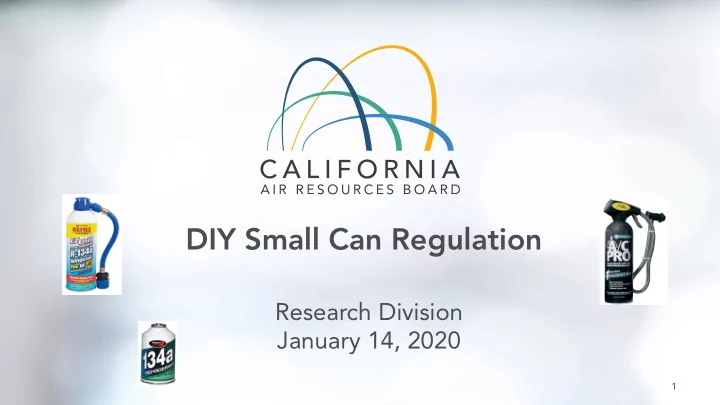

DIY Small Can Regulation Research Division January 14, 2020 1
Background • Measure to reduce GHG emissions from automotive refrigerants in small containers • These small cans contain HFC-134a, a gas with a Global Warming Potential (GWP) 1,430 times that of CO 2 • Adopted in 2009; and adopted in 2016 • Major regulatory requirements: Self-sealing valve on all containers $10 Deposit and recycling programs Consumer education program Product certification and labeling requirements Annual reporting of container sales and returns 2
Enhanced Education Program (EEP) and Key Players • EEP • Designed to inform consumers of measures to reduce GHG emissions associated with DIY recharging of motor vehicle AC systems • Key Players • CARB • Manufacturers or their designee- Car Care Council to manage unclaimed deposits • Distributors • Retailers and Independent Stores • DIYers • Public 3
Major Amendment • Adopted in April 2016 and became effective on April 13, 2017 • Container deposit fixed at $10 • Detailed requirements for retailers to transfer unclaimed consumer deposits to manufacturers • Manufacturers required to manage unclaimed deposits and develop annual spending plan and report • Expanded scope for spending the unclaimed deposits Enhanced Education Program (EEP) 4
Important Dates for Regulation Due April 1 Due May 1 All unclaimed Outreach report and deposits collected Due March 1 spending plan for must be transferred unclaimed deposits to the manufacturer Annual reports Manufacturers, Distributors and Manufacturers Distributors, and Retailers or designee Retailers 5
Why Enhanced Education Program (EEP)? • Return rate=No. of cans returned/ No. of cans sold • Initial benchmark return rate expected at 90% and 22% can heel • Return rate and can heel much lower than expected Year 2011 2012 2013 2014 2015 2016 2017 2018 Retailer Return 69% 73% 69% 66% 66% 68% 62% 57% Manufacturer’s Recycling 1.16% 1.60% 2.29% 4.29% 2.70% 1.94% 5.16% 5.53% Center 6
Overview of Small Can Retail Compliance Inspections Research Division January 14, 2020 7
Historical Inspection Comparison Year 2014 2015 2016 2017 2018 2019 # of inspected 94 55 125 114 153 175 stores Lack of consumer 69% 51% 38% 52% 47% 10% brochures Lack of placard 41% 18% 22% 31% 29% 7% display Selling illegal cans 7% 2% 1% 4% 2% 1% Lack of storage 10% 15% 8% 8% 1% 3% bins Accepting empty 11% 25% 10% 13% 13% 13% cans only 8
Environmental Justice Analysis • Environmental justice (EJ) communities commonly identified as those where residents are predominantly minorities or low-income, and disproportionately impacted by environmental hazards. • Communities designated EJ https://oehha.ca.gov/calenviroscreen. • These communities are the primary audience for DIY AC servicing products. relevant empty lack brochure lack placard illegal cans lack storage bins locations cans only 49% 30% 3% 4% 13% 2016-2018 All Stores 10% 7% 1% 3% 13% 2019 58% 32% 3% 1% 27% 2016-2018 EJ 3% 3% 0 % 1% 5% 2019 9
Cans Accepted and Destination • A question that arose during the course of these inspections was about the ultimate fate of the can, as well as which cans were being accepted. • This revealed issues with not accepting partial cans as well as highlighting that some locations give the cans over to hazmat rather than recycling it. Accepted Returns returned to Empty cans Partial empty returned to returned to 2019 manufacturer or only only distributor hazmat recycling center All Stores 1% 14% 3% 92% 6% 10
Summary • In 2019, stores showed greatly increased compliance in terms of signage and bilingual placard but no change on other items. • Near total compliance of stores not selling illegal cans. • CARB is greatly concerned about retailers only accepting empty cans and lack of storage bins and will be actively looking into the issue. 11
How to Contact Us • DIY Contact: • Van Tsan, van.tsan@arb.ca.gov • (916) 327-8543 • DIY Webpage • https://ww2.arb.ca.gov/our-work/programs/small- containers-automotive-refrigerant 12
Discussion • Feedback of Enhanced Education Programs • Return Data Needs • Data format easiest for retailers • Store by store or zip code • Can Heel Test with CCC • Not successful during vehicle check up event • Designate Retailer for Accepting Return Cans • Financial incentives 13
Recommend
More recommend